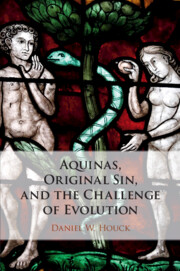Book contents
- Aquinas, Original Sin, and the Challenge of Evolution
- Aquinas, Original Sin, and the Challenge of Evolution
- Copyright page
- Dedication
- Contents
- Acknowledgments
- Introduction
- 1 Augustine and the Long Twelfth Century
- 2 Aquinas on Original Justice
- 3 Aquinas on the Effects of Original Sin
- 4 Aquinas on Original Guilt
- 5 Original Sin and Some Modern Theologians
- 6 Original Sin and the Challenge of Evolution
- 7 Original Sin
- 8 A Response to Some Objections
- Conclusion
- Select Bibliography
- Index
1 - Augustine and the Long Twelfth Century
Published online by Cambridge University Press: 22 February 2020
- Aquinas, Original Sin, and the Challenge of Evolution
- Aquinas, Original Sin, and the Challenge of Evolution
- Copyright page
- Dedication
- Contents
- Acknowledgments
- Introduction
- 1 Augustine and the Long Twelfth Century
- 2 Aquinas on Original Justice
- 3 Aquinas on the Effects of Original Sin
- 4 Aquinas on Original Guilt
- 5 Original Sin and Some Modern Theologians
- 6 Original Sin and the Challenge of Evolution
- 7 Original Sin
- 8 A Response to Some Objections
- Conclusion
- Select Bibliography
- Index
Summary
Chapter 1 puts Thomas’s account in its historical context by discussing Augustine and his medieval reception. The first part of the chapter focuses on Augustine’s mature account of original sin, drawing on The City of God and his anti-Pelagian works. I argue that Augustine’s account contained several fruitful ambiguities which would be the basis for medieval reflection. How should we understand the transmission of original sin and the origin of the soul? In what sense are infants guilty of sin? How can we make sense of the claim that human nature has been “corrupted”? The second major part of the chapter discusses Anselm of Canterbury, Peter Abelard, and Peter Lombard. Each of these theologians defended original sin while challenging at least one important aspect of Augustine’s teaching. Anselm claimed that concupiscence cannot be sinful. Abelard denied original guilt. The Lombard emphatically denied traducianism and insisted that infants who die unbaptized are guilty only in a highly mitigated sense.
Keywords
- Type
- Chapter
- Information
- Aquinas, Original Sin, and the Challenge of Evolution , pp. 15 - 54Publisher: Cambridge University PressPrint publication year: 2020

